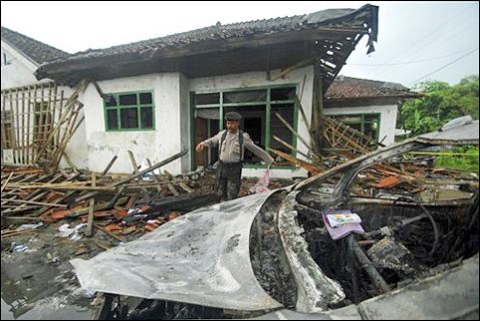Editorials
Religious Violence In Indonesia
A small but vocal and sometimes violent minority rejects the equal rights of all groups. Recently there have been several worrisome instances of religious violence.
02-23-2011
 Photo: AP
Photo: APA police officer inspects the damage at the house of a member of Ahmadiyah sect after it was attacked by Muslim mob in Pandeglang, Banten province, Indonesia, February 7, 2011
Indonesia has a rich tradition of respecting religious pluralism and promoting tolerance. However, a small but vocal and sometimes violent minority rejects the equal rights of all groups. Recently there have been several worrisome instances of religious violence.
On February 6th, a mob attacked a house belonging to a leader of the Ahmadiyah community. Three members of the Muslim minority sect were brutally killed. A video of the incident shows the police at the scene but not intervening to stop the violence.
The Ahamadiyah sect, which numbers in the hundreds of thousands in Indonesia, was founded in the 19th century and differs from orthodox Muslims in that members do not believe Mohammed was the final prophet. In 2008, the Indonesian government issued a decree prohibiting the Ahmadiya from promoting their faith publically. Some human rights activists believe the decree fuels societal discrimination against the Ahmadiya community.
Two days after the attack on the Ahmadiyah, another mob in Temanggung, Central Java, set fire to churches after a Christian man received a five-year prison sentence for insulting Islam. Police said eight people were arrested over the incident.
On February 15th, hundreds of men attacked a Shi’a religious school in East Java, injuring at least six students. Shi’a followers represent a small minority of Indonesian Muslims. The police apprehended three suspects, but the affiliation of the attackers remains unclear.
Indonesian President Susilo Bambang Yudhoyono has stated that the government of Indonesia will take firm action against the perpetrators of the violence, underscoring Indonesia’s commitment to rule of law and to the protection of the rights of all communities. Indonesian police have arrested a number of suspects believed to be involved in these incidents.
The United States is deeply concerned about the recent violence in Indonesia directed at members of the minority Muslim communities and about the recent church burnings in Central Java. The United States joins the vast majority of Indonesians in deploring these acts of violence.
The right to freedom of religion is an internationally recognized fundamental freedom. The Indonesian constitution provides for freedom of religion and accords “all persons the right to worship according to their own religion and belief.” The United States joins the vast majority of Indonesians in urging differences to be met with understanding and tolerance.
On February 6th, a mob attacked a house belonging to a leader of the Ahmadiyah community. Three members of the Muslim minority sect were brutally killed. A video of the incident shows the police at the scene but not intervening to stop the violence.
The Ahamadiyah sect, which numbers in the hundreds of thousands in Indonesia, was founded in the 19th century and differs from orthodox Muslims in that members do not believe Mohammed was the final prophet. In 2008, the Indonesian government issued a decree prohibiting the Ahmadiya from promoting their faith publically. Some human rights activists believe the decree fuels societal discrimination against the Ahmadiya community.
Two days after the attack on the Ahmadiyah, another mob in Temanggung, Central Java, set fire to churches after a Christian man received a five-year prison sentence for insulting Islam. Police said eight people were arrested over the incident.
On February 15th, hundreds of men attacked a Shi’a religious school in East Java, injuring at least six students. Shi’a followers represent a small minority of Indonesian Muslims. The police apprehended three suspects, but the affiliation of the attackers remains unclear.
Indonesian President Susilo Bambang Yudhoyono has stated that the government of Indonesia will take firm action against the perpetrators of the violence, underscoring Indonesia’s commitment to rule of law and to the protection of the rights of all communities. Indonesian police have arrested a number of suspects believed to be involved in these incidents.
The United States is deeply concerned about the recent violence in Indonesia directed at members of the minority Muslim communities and about the recent church burnings in Central Java. The United States joins the vast majority of Indonesians in deploring these acts of violence.
The right to freedom of religion is an internationally recognized fundamental freedom. The Indonesian constitution provides for freedom of religion and accords “all persons the right to worship according to their own religion and belief.” The United States joins the vast majority of Indonesians in urging differences to be met with understanding and tolerance.





